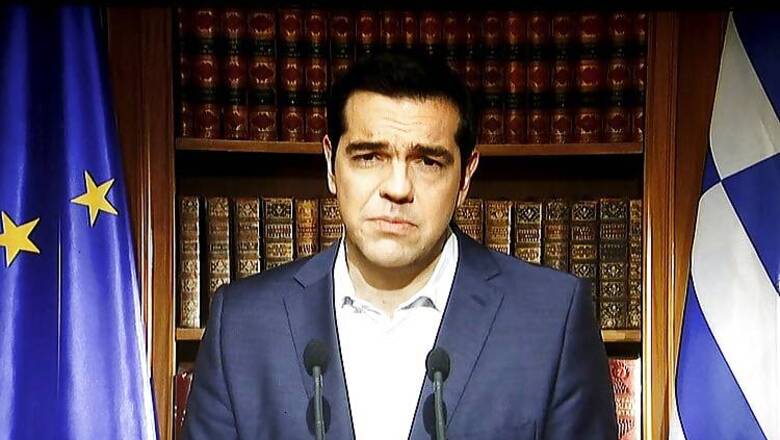
views
Athens: Alexis Tsipras will submit his resignation to the country's president later Thursday to clear the way for early elections on September 20, a government official said.
Tspiras, elected in January, is expected to make a televised state address on Thursday evening. Tsipras effectively lost his parliamentary majority after a rebellion by hardliners in his Syriza party who oppose a bailout agreement struck with international lenders.
Tsipras is seeking early elections, hoping to quell a rebellion in his leftist Syriza party and seal support to implement a tough bailout programme.
Ministers have openly debated for days about what the government should do after a large number of hard left Syriza lawmakers refused to back the 86 billion euro ($96 billion)bailout in parliament on Friday.
However, a government official said on Thursday that the option of calling a parliamentary confidence vote had been shelved and the idea of seeking snap polls as early as mid-September had become more likely.
Tsipras who remains popular in Greece and would be widely expected to return to power if elections were held now was huddling with senior advisers on Thursday afternoon to decide his next move, a government official said.
"Everything is possible," the official told reporters when asked whether Tsipras could announce elections later in the day.
ERT state television said the timing of snap elections would be announced later on Thursday. Tsipras won power only in January and Greece's complex constitution has special stipulations for holding elections less than 12 months after the previous vote. Under these, President Prokopis Pavlopoulos cannot immediately call an election if Tsipras resigns, but must first consult the other major parties to see if they could form a government a remote likelihood with the current parliamentary arithmetic.
Tsipras had been expected to call snap polls at some point in the autumn after his bruising seven months in office when Greece nearly crashed out of the euro zone and shut its banks for three weeks during a standoff with its euro zone and IMF creditors.
After campaigning against bailouts, the 41-year-old prime minister accepted last month Greece's third bailout, which demands tax increases and spending cuts, to avoid a banking collapse.
But the votes in parliament to pass the austerity measures laid bare a revolt by nearly a third of Syriza lawmakers, forcing Tsipras to rely on opposition support and robbing him of a guaranteed parliamentary majority.
AID DISBURSED
With the bailout finally approved in parliament and the first installment of aid disbursed allowing Greece to repay a debt to the European Central Bank that fell due on Thursday - Tsipras is turning his focus to internal politics.
Senior aides, such as Energy Minister Panos Skourletis, said the split with the party rebels who are threatening to break away had to be dealt with. "The political landscape must clear up. We need to know whether the government has or does not have a majority," he told ERT.
Syriza is expected to call a party congress in September to resolve differences with the rebels. But, expressing his personal opinion, Skourletis said Tsipras should move faster. "I would say elections first, then the party congress," he said.
Tsipras is weighing at least two options. One is to call elections in September before voters start feeling the new bailout measures including further pension cuts, more value-added tax increases and a "solidarity" tax on incomes.
Knock-on effects of capital controls imposed in June, which are likely to stay until Greek banks are recapitalised later this year with bailout funds, will also hurt voters.
The other option is to delay the vote till October, after international creditors have reviewed Greece's performance in keeping to the bailout programme. They will then start to consider some way of easing the country's huge debt burden.
Tsipras has long argued that Greece will never be able to repay all its debts and wants some to be written off. While the euro zone favours merely delaying interest and principal repayments, Tsipras could still present any debt relief moves as an achievement to the electorate.
A Metron Analysis poll on July 24 put support for Syriza at 33.6 percent, making it by far the most popular party, but not enough to govern without a coalition partner. No polls have been published since then due to the holiday season.
Syriza members have argued that the party should aim for a majority, saying this would achieve the stable government which Greece has lacked through the past five years of crisis.
"These elections, whenever they are announced by the government, will provide a stable governing solution. My feeling is that Syriza will have an absolute majority," Dimitris Papadimoulis, a Syriza lawmaker in the European parliament, told Mega TV.
($1 = 0.8990 euros)

















Comments
0 comment